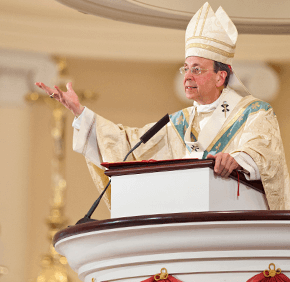By Maria Wiering
mwiering@CatholicReview.org
More than 1,000 people packed the Basilica of the National Shrine of the Assumption of the Blessed Virgin Mary June 21 for the opening of the third annual Fortnight for Freedom, two weeks dedicated to prayer, education and advocacy for religious freedom.
Here are five takeaways from the launch of the Fortnight:
1. When it comes to religious freedom, Archbishop Lori is the go-to guy.
Archbishop Lori, who celebrated the opening Mass, is chairman of the U.S. Conference of Catholic Bishops’ Ad Hoc Committee for Religious Liberty, formed in 2011. In 2012, it published a letter “Our First, Most Cherished Liberty” and launched the Fortnight for Freedom event in response to government infringement on religious freedom rights in the United States and abroad.
Chief among those perceived threats is the U.S. Department of Health and Human Services’ mandate that most employers, including religious employers, provide insurance for artificial birth control, sterilization and abortion-causing drugs.
In his homily, Archbishop Lori criticized the mandate, as well as state laws criminalizing churches that serve immigrants living in the country illegally and “discrimination against Catholic humanitarian services because they refuse to provide so-called ‘services’ that violate Catholic teaching.”
2. The 2014 Fortnight theme is “The Freedom to Serve.”
During the Mass, Archbishop Lori distinguished the church’s work from that of non-governmental agencies, as Pope Francis has done, adding that Catholics “are to be more than an NGO” by virtue of a “eucharistic heart.”
“We are seeking for the church and for church institutions no special privileges,” he said. “We are seeking the freedom to serve, or as Pope Francis once put it, the freedom to proclaim and live the Gospel ‘in its entirety.’”
He asked Catholics to keep “in the forefront of our hearts” people whom U.S. Catholic humanitarian agencies, parishes and individuals serve.
“Let us look at them not merely as statistics but as persons created in God’s image and called to enjoy friendship with God,” he said.
3. Prayer is central to the Fortnight’s mission.
Among the Mass’ attendees were members of the Baltimore-based Little Sisters of the Poor, plaintiffs in a well-publicized lawsuit against the federal government over the HHS mandate. The U.S. Supreme Court granted the sisters a temporary injunction in January.
In an interview after Mass, Mother Loraine Marie Clare Maguire, the Little Sisters’ provincial superior, urged Catholics to pray for religious freedom.
“Religious freedom is very important to us and to our mission of caring for the elderly,” she said. “You can’t do anything without prayer, and the Eucharist is the summit of our prayer life. It’s what brings us together as a community to pray.”
4. The Eucharist and charitable works are deeply connected.
The Eucharist conforms Catholics to “the pattern of Christ’s self-giving love” and compels them to see the dignity of the poor and perform acts of mercy, Archbishop Lori said in his homily.
“By entering the dynamic of Christ’s self-giving eucharistic love, we are impelled … to work for a loving and just society where the dignity of human life is respected from conception until natural death and all the stages in between,” he said.
“May we find in the Eucharist the source and summit of our charity, and in that charity may we advocate by word and witness for the robust freedom of individuals and churches not only to worship without fear but indeed serve others and the common good in love, truth, joy and freedom.”
5. In the U.S., challenges to religious freedom are subtle, but real
Archbishop Lori acknowledged that in other countries, people are killed for professing their faith. In the United States, he said, the challenges to religious freedom are more subtle yet “very real.”
“Increasingly, government at all levels is asserting itself in the internal life of churches, telling them that houses of worship are fully religious, whereas religious schools and charities that serve the common good are less so, and therefore less deserving of religious freedom protections,” he said.
To read the full news article on the opening Mass, click here.
Also see:


